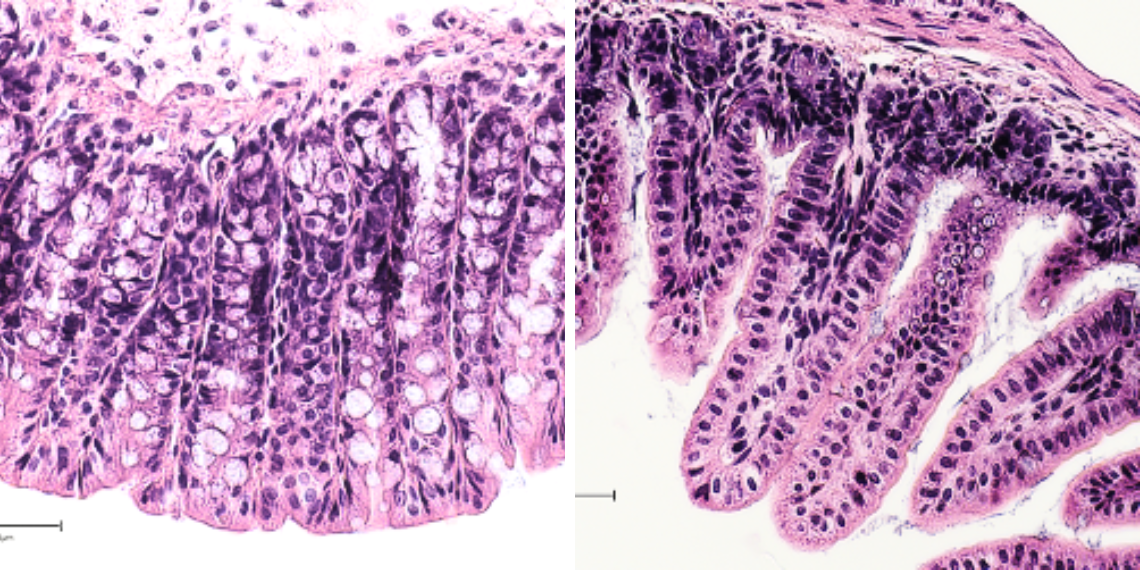You are What Your Mother Eats: Omega-3s Boost Gut Health in Mice Offspring

A new study from the Department of Human Health and Nutritional Sciences shows that the saying “you are what you eat” may be true even before you are born. Researchers have found that a mother’s consumption of omega-3 fatty acids during pregnancy can significantly impact the intestinal health of her offspring.
Led by Dr. Jennifer Monk, the study found that early exposure to either plant- or fish-based sources of omega-3 fatty acids has a positive effect on indicators of intestinal health in mice.
The interactions between the gut microbiome, diet and intestinal integrity have long been a topic of interest to Monk.
“‘Leakiness’ of the epithelial barrier in the GI tract seems to be a component of many chronic diseases,” explains Monk, “including inflammatory bowel disease, obesity, type 1 and type 2 diabetes and even cardiovascular disease.” Understanding what drives this process and identifying interventions to reduce barrier leakiness may help reduce the severity of these conditions.
And when it comes to the role of diet, says Monk, there is still much debate in the scientific literature about which fatty acids are actually the most beneficial. Most research to date has focused on the effects of longer-chain fatty acids (derived from marine dietary sources) on health, and Monk’s study is one of only a few to investigate shorter-chain omega-3 fatty acids derived from plant dietary sources.
The focus on early life exposure to omega-3s was also a key element of the study. “Proper nutrition during critical periods of growth and development may significantly impact an individual’s short- and long-term health outcomes,” explains Monk. The transition from maternal milk to solid feed is one such critical period, because this is when intestinal barrier defenses need to be established to protect against infection.
In the study, pregnant mice were fed a standard diet supplemented with either (i) safflower oil; (ii) safflower oil and flaxseed oil, a plant-based source of omega-3; or (iii) safflower oil and menhaden fish oil, a marine-based source of omega-3. All three diets had the same caloric content and fat content, with the only difference being the source of the fat. Following birth, the mothers continued to be fed the same diet until pups weaned at three weeks of age.
The team then looked at intestinal morphology and molecular biomarkers of gut health in the mice pups. They found that early life exposure to both plant or marine dietary sources of omega-3s supported the development of healthier guts compared to the safflower oil control.
But the team also found some key differences between the plant- and fish-based omega-3s. For example, only fish-based omega-3s increased the number of mucus-secreting “goblet cells” in the intestine, which help create the protective mucus barrier lining the gut.
The study offers an exciting proof-of-concept that increasing omega-3 intake could be an effective and non-invasive approach to enhance intestinal barrier defensive function during a critical stage of development. A key avenue for future research will be gaining a better understanding of how the biological activity of plant- and fish-based omega-3s differ, to optimize intake recommendations to promote health outcomes.
This research was conducted in collaboration with Dr. David Ma, Department of Human Health and Nutritional Sciences, with funding from the Natural Sciences and Engineering Research Council of Canada, the Canadian Foundation for Innovation, and the Ontario Research Fund.
Read the full study in the journal Nutrients.
Read about other CBS Research Highlights.